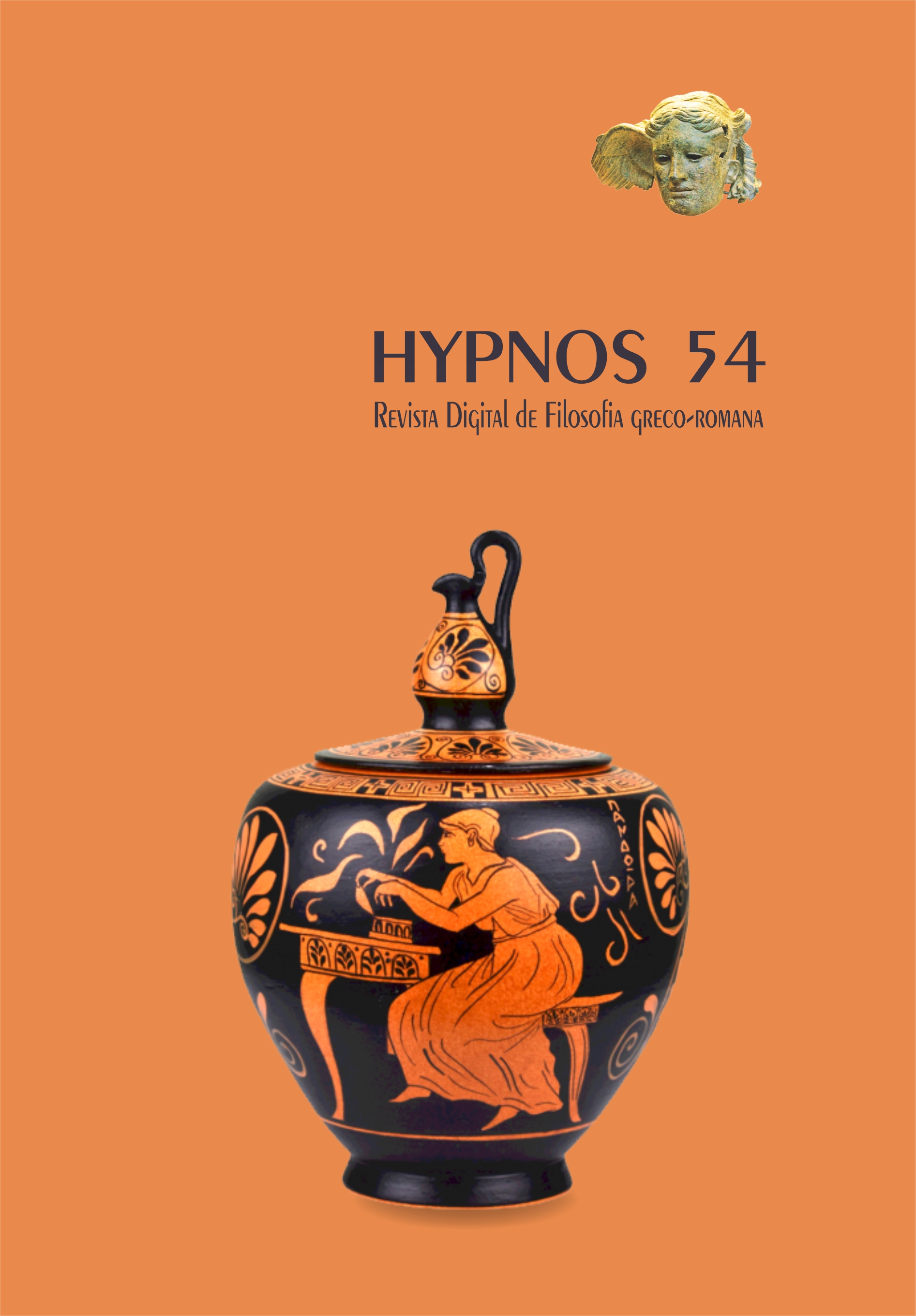Dramatic aspects of Lysis: the setting and the relationships between its characters
Keywords:
Plato, Lysis, Socratic dialogue, drama, friendshipAbstract
Considering the fundamental interweaving in a Platonic dialogue – a multifaceted object – between its philosophical content and its dramatic construction, this article aims to highlight the tensions and contrasts among the characters in the Lysis, one of Plato’s early dialogues. The investigation confirms the presence of theoretical intentions and strategic choices made by the author in the scenic composition of the text and seeks to point out the role of the relationships between the characters in the elaboration of concepts and the logical-argumentative development of the work.
References
ANDERSON, Trevor. “Cutting Them Down to Size”: Humbling and Protreptic in Plato’s Lysis. Revista Archai, Brasília, v.32, 2022.
BLONDELL, Ruby. The Play of Character in Plato’s Dialogue. 1. ed. Cambridge: Cambridge University Press, 2003.
COOPER, John M. Plato: Complete Works. 1. ed. Indianapolis: Hackett Publishing Company, 1997.
EVANGELOU, G. The Role of Socrates, Lysis, and Menexenus in Plato’s Lysis. Filozofia, v. 75, n. 3, 2020, p. 195-211.
FREDE, Michael. Plato's Arguments and the Dialogue Form. Oxford Studies in Ancient Philosophy, Oxford, p. 201-219, 1992.
GADAMER, Hans-Georg. Logos and Ergon in Plato’s Lysis. In: Dialogue and Dialectic: Eight hermeneutical studies on Plato. 1. ed. New Haven: Yale University Press, 1983.
GONZALEZ, Francisco J. How to Read a Platonic Prologue: Lysis 203A–207D. In: MICHELINI, Ann N. Plato as Author: The rhetoric of philosophy. Cincinnati Classical Studies, v. 8, p. 15-44, 2003.
HADEN, James. Friendship in Plato's ‘Lysis’. The Review of Metaphysics, Salisbury, v. 37 n. 2, p. 327-356, 1983.
HOERBER, Robert G. Plato’s “Lysis”. Phronesis, Leiden, v. 4, n. 1, p. 15-28, 1959.
KAHN, Charles H. Plato and the Socratic Dialogue: The philosophical use of a literary form. 2. ed. Cambridge: Cambridge University Press, 2004.
KEFALIDOU, Eurydice. The plants of victory in ancient Greece and Rome. In: Plants and Culture: seeds of the cultural heritage of Europe. Bari: Edipuglia, 2009, p. 39-44.
MORAES, Deivid Junio. Entre Oralidade e Escritura: A forma dialógica em Platão. Revista Ética e Filosofia Política, Juiz de Fora, v. 2, n. 19, p. 116-134, dez. 2016.
NAILS, Debra. The People of Plato: A prosopography of plato and other socratics. 1. ed. Indianapolis: Hackett Publishing Company, 2002.
PECK, Harry Thurston. Harper's dictionary of classical literature and antiquities. 1. ed. New York: Harper & brothers, 1896.
PLATÃO. Apologia de Sócrates. In: COOPER, John M. Plato: Complete Works. 1. ed. Indianapolis: Hackett Publishing Company, 1997.
PLATÃO. Lísis. In: PENNER, Terry; ROWE Christopher. Plato’s Lysis. 1. ed. Cambridge: Cambridge University Press, 2005.
PLATÃO. Menexeno. In: COOPER, John M. Plato: Complete Works. 1. ed. Indianapolis: Hackett Publishing Company, 1997.
ROOCHNIK, David. Plato’s Lysis and the Erotics of Philia. Revista Archai, Brasília, v.32, 2022.
ROSSETTI, Lívio. O Diálogo Socrático. 1. ed. São Paulo: Paulus, 2015.
SZAIF, Jan; JENNINGS, David. Introduction to Studies on Plato’s Lysis. Revista Archai, Brasília, v.32, 2022.
TARRANT, Dorothy. Plato as a Dramatist. The Journal of Hellenic Studies, Cambridge, v. 75, p. 82-89, 1955.
XENOFONTE. Ditos e Feitos Memoráveis de Sócrates. In: CIVITA, Victor. Os Pensadores: II. 1. ed. São Paulo, Abril Cultural, 1972.
Downloads
Published
Issue
Section
License
Copyright (c) 2025 Hypnos Journal

This work is licensed under a Creative Commons Attribution-NonCommercial-ShareAlike 4.0 International License.
The contents of the manuscript have been tacitly or explicitly approved by the responsible authorities where the research was carried out.
Upon acceptation of the manuscript, the author agrees to allow its publication by Hypnos, declining pecuniary gains due from copyright. If the manuscript is published later in other media, the author agrees to always give credits of its first publication in Hypnos.
If the submitted document includes figures, tables, or large sections of text previously published, the author declares himself responsible for having obtained permission of the original copyright owners of these items for both the online and printed publication of this journal. Credits for copyrighted material must be properly attributed in the manuscript.


 A revista
A revista 